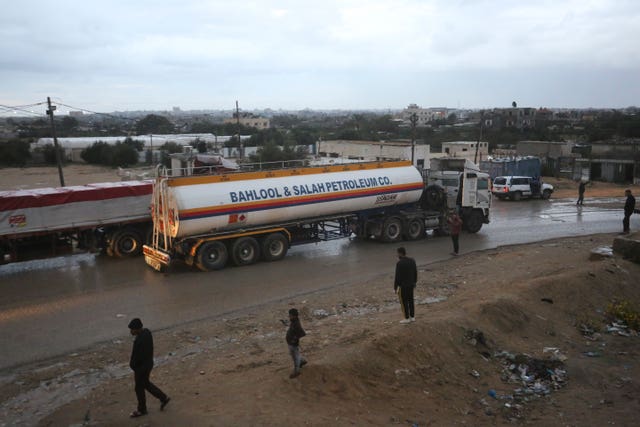Israel and Hamas have agreed to extend their ceasefire for two more days past Monday, raising the prospect of further exchanges of militant-held hostages for Palestinians imprisoned by Israel and a longer halt to their deadliest and most destructive war.
Eleven Israeli women and children, freed by Hamas, entered Israel on Monday night in the fourth swap under the original four-day truce, which began on Friday and had been due to run out.
Israel’s prison service said early on Tuesday that it was releasing 33 Palestinian prisoners as part of the ceasefire deal. The prisoners were heading to the West Bank.
The deal for two additional days of ceasefire, announced by Qatar, raises hopes for further extensions, which also allow more aid into Gaza.
Conditions there have remained dire for 2.3 million Palestinians, battered by weeks of Israeli bombardment and a ground offensive that have driven three-quarters of the population from their homes.
Israel has said it would extend the ceasefire by one day for every 10 additional hostages released.
After the announcement by Qatar – a key mediator in the conflict, along with the United States and Egypt – Hamas confirmed it had agreed to a two-day extension “under the same terms”.
But Israel says it remains committed to crushing Hamas’s military capabilities and ending its 16-year rule over Gaza after its October 7 attack into southern Israel.
That would probably mean expanding a ground offensive from devastated northern Gaza to the south.
Monday’s releases bring to 50 the number of Israelis freed under the truce, along with 19 hostages of other nationalities.
So far, 117 Palestinians have been released from Israeli prison.
After weeks of national trauma over the roughly 240 people abducted by Hamas and other militants, scenes of the women and children reuniting with families have rallied Israelis behind calls to return those who remain in captivity.

“We can get all hostages back home. We have to keep pushing,” two relatives of Abigail Edan, a four-year-old girl and dual Israeli-American citizen who was released on Sunday, said in a statement.
Hamas and other militants could still be holding up to 175 hostages, enough to potentially extend the ceasefire for two-and-a-half weeks.
But those include a number of soldiers, and Hamas is likely to make much greater demands for their release.
The newly released hostages included women and children – including three-year-old twin girls and their mother – from the kibbutz Nir Oz, a community near Gaza that was hard hit in Hamas’s October 7 attack.
The kibbutz said 49 of its residents remain in captivity, including the father of the twins.
The Israeli military said late on Monday that the hostages were undergoing initial medical checks in Israel before being reunited with their families.
Most of the hostages freed so far have appeared to be physically well.
But 84-year-old Elma Avraham, released on Sunday, was airlifted to Israel’s Soroka Medical Centre in a life-threatening condition because of inadequate care, the hospital said.

Ms Avraham’s daughter, Tali Amano, said her mother was “hours from death” when she was brought to the hospital.
Ms Avraham is currently sedated and has a breathing tube, but Ms Amano said she told her of a new great-grandchild who was born while she was in captivity.
Ms Avraham suffered from several chronic conditions that required regular medications but was stable before she was kidnapped, Ms Amano said on Monday.
So far, 19 people of other nationalities have been freed during the truce, mostly Thai nationals.
Many Thais work in Israel, largely as farm labourers.
France said three of the hostages released on Monday were French-Israeli dual citizens, two 12-year-olds and one 16-year-old.
The French government is “working tirelessly” to free five other French citizens held hostage, the French Foreign Ministry said in a statement.
The Palestinian prisoners released so far have been mostly teenagers accused of throwing stones and firebombs during confrontations with Israeli forces, or of less serious offences.
Many Palestinians view prisoners held by Israel, including those implicated in attacks, as heroes resisting occupation.
The freed hostages have mostly stayed out of the public eye, but details of their captivity have started to trickle out.

Merav Raviv, whose three relatives were released on Friday, said they had been fed irregularly and lost weight.
One reported eating mainly bread and rice and sleeping on a makeshift bed of chairs pushed together.
Hostages sometimes had to wait for hours to use the bathroom, she said.
In Washington, White House National Security Council spokesman John Kirby welcomed the extension of the truce.
“We would of course hope to see the pause extended further, and that will depend upon Hamas continuing to release hostages,” Mr Kirby told reporters.
More than 13,300 Palestinians have been killed since the war began, roughly two thirds of them women and minors, according to the Health Ministry in Hamas-ruled Gaza, which does not differentiate between civilians and combatants.
More than 1,200 people have been killed on the Israeli side, mostly civilians killed in the initial attack.
At least 77 soldiers have been killed in Israel’s ground offensive.




Comments: Our rules
We want our comments to be a lively and valuable part of our community - a place where readers can debate and engage with the most important local issues. The ability to comment on our stories is a privilege, not a right, however, and that privilege may be withdrawn if it is abused or misused.
Please report any comments that break our rules.
Read the rules hereLast Updated:
Report this comment Cancel